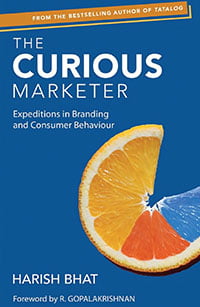
Why Being Curious is so Important for Today's Brands
By Alyssa Ruane
Curiosity may kill the cat, but it can give the marketer nine lives. That’s how Harish Bhat, author of “The Curious Marketer,” sees it. And he’s right: When trying to market your product or services, the bare minimum can be a death sentence. With so many forms of media presenting new opportunities to reach your audience, there is no one-way ticket. Marketers need to be steadfast in their pursuit of new ideas.
One of the best ways to sharpen innovation skills is to increase your Curiosity Quotient (CQ). Coined by author and journalist Thomas L. Friedman, the Curiosity Quotient alludes to a person’s innate ability to dig for fresh perspectives. When you combine your CQ with a PQ (Passion Quotient), Friedman suggests, you get a result that could be more valuable than a high IQ. He puts forth this fictional equation for reference: CQ + PQ > IQ.
Other experts agree.
Bhat says that curiosity drives you to make the necessary connections that lead from human needs to fabulous new products and services. Take this story about Steve Jobs. In his commencement address at Stanford University, the Apple founder talked about how his curiosity led him to learn calligraphy, which, several years later, helped him design the distinctive Apple Macintosh computer’s interface.
That’s the thing about curiosity; it can be unpredictable and sneaky. The simple action of trying a new activity may not seem like a big innovative step at the time, but just one experience can ignite your creativity and help you reach new heights.

Increasing the Curiosity Quotient
As the media and marketing landscapes continue to change, marketers must learn to embrace and capitalize upon this amorphous nature. Without new learning taking place frequently, the marketing mind can become stagnant.
Smart marketers place an importance on personal improvement. Increasing their CQ is crucial to success. Over time, keeping your mind engaged with inquisitiveness will broaden your perspective and sharpen your intellect.
Bhat believes passion is the key ingredient to a successful brand. “[It] is a good bedfellow to curiosity, because passion is such a wonderful source of intellectual and physical energy that is always required to chisel and sharpen a great brand. Passion breathes life into a brand and makes it beautiful.”
When searching for the next lightbulb moment, don’t think about what outsiders might want or expect. Instead, think about what drives you to your brand. What makes you really excited? Try to uncover some of these passions. Doing so will spark your mind into a flurry of creative questioning and invention.
In Bhat’s book, he parlays the seven steps it takes to increase your curiosity as a marketer. First, be aware that you do not know it all. Second, ask questions all the time. The third and fourth steps are to listen extensively without judgment and watch your consumers with a keen and fresh eye. Instead of getting comfortable, constantly wonder how your consumers’ attitudes toward your brand might be changing.
In the fifth step, Bhat recommends seeking new experiences and meeting new people while the sixth step requires embracing the unexpected, as unexpected events tend to spark your curiosity. The final step is the one tied to new learning. “Read, read and read,” Bhat says. “Reading provides you a window into fascinating new worlds that trigger your curiosity time and again.”
If following seven steps sounds like too much of an effort, you’re in luck. Bhat says that even following three or four of these actions can help make you more curious than you were before.

Why you need to be curious
It can be easy to get sucked into the everyday ho-hum of your job. You show up, mindlessly do the work required, and go home. If you don’t put in any additional effort, your work may suffer. To truly excel at your craft, and help your brand succeed, you have to change your mindset.
Caroline Stokes, founder of The Forward Co., believes being open-minded helps increase your overall emotional intelligence, which will prompt questions that matter and lead to innovation. Emotional intelligence and curiosity go hand-in-hand in that they both rely on your mind to stay open and consider multiple viewpoints.
It’s this type of thinking that enables marketers to succeed because they’re thinking outside of the box rather than just looking at the box in front of them.
And the creativity that comes with curiosity is not the only perk of seeking outside perspectives. Curiosity will breed more fulfillment in your career. “I was working at Sony and working in very high-pressure roles,” says Stokes, who also hosts “The Emotionally Intelligent Recruiter” podcast.
Stokes likens the pursuit of curiosity to the never-ending pursuit of ripped abs. “It’s a daily thing,” she says. “It takes probably over two years of doing ab crunches every single day to get that washboard effect. It’s the same thing with curiosity. You have to diligently tick it off of your to-do list every day.”
The key is to be comfortable asking questions. “Brands succeed when they help solve problems in people’s lives, when they cater to unmet needs,” Bhat says. “Curiosity helps you unearth these needs. It also helps you ideate and create the great brand that meets these needs.”
Being curious helps marketers connect the dots between human needs and what the brand delivers to its consumers. “If you’re creating a marketing campaign and you’re the data analyst or the creative designer, if you’re not curious about what will really work for the client or your product or the service you’re selling, it’s just not going to land in the right way,” Stokes says. “You need to be curious when you’re doing your research.”
You really don’t know everything.
Self-reflection plays an important role in self-improvement. That’s where the divide between IQ and CQ comes in.

“We are learning machines,” Stokes says. “We want to learn. We are able to analyze things.”
Having stark, straightforward openness about not knowing everything as an individual can be a catalyst for productive collaboration. The best marketers and the most curious people are very good listeners and, most importantly, they listen without judgment.
“When you pass spot judgment on something you are hearing, your mind is no longer open to new ideas or thoughts,” Bhat says. “On the other hand, when you listen with a mind that is totally open, you are willing to soak in knowledge without any inhibiting filters. Marketers gain far more knowledge when they listen carefully and silently, rather than when they speak utilizing their own knowledge.”
